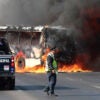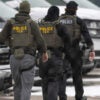The shocking attempt to murder writer Salman Rushdie last Friday in New York wasn’t just a criminal attack on the author but probably also an Iranian-inspired (and possibly Iranian-directed) act of terrorism.
Rushdie, after publishing the controversial 1988 novel “The Satanic Verses,” was targeted for death in a fatwa (or Islamic edict) issued in February 1989 by Ayatollah Ruhollah Khomeini, supreme leader of Iran’s Islamic revolution.
Khomeini called on Muslims to kill the British-American novelist for blasphemy, along with anyone involved in the publication of his book.
Iranian organizations, including many affiliated with the government, put a $2.8 million bounty on Rushdie’s head and forced him into hiding, under the protection of the British government. A Lebanese man who plotted to kill Rushdie with a book bomb blew himself up accidentally in a London hotel in August 1989 before he could enforce the fatwa against the author.
Bookstores that sold “The Satanic Verses” were fire-bombed in the United States, the United Kingdom, Norway, and Australia. A Japanese translator of the book was murdered in 1991; an Italian translator and a Norwegian publisher were fortunate to survive murder attempts.
Although Iran’s government claimed in 1998 that the fatwa no longer would be enforced, Ayatollah Ali Khamenei, who succeeded Khomeini as Iran’s supreme leader, repeatedly has insisted that the fatwa had not been rescinded.
In 2019, Twitter suspended Khamenei’s Twitter account after he tweeted that the fatwa against Rushdie was “irrevocable.”
Iran Blames the Victim
Iran’s Islamic regime has denied responsibility for the onstage stabbing of Rushdie, 75, as he began to speak in Chautauqua, New York, and blamed the victim for bringing it on himself.
Rushdie’s agent said the novelist suffered a damaged liver and severed nerves in an arm and in an eye that he likely would lose, The Associated Press reported. The writer was taken off a ventilator Saturday.
A spokesman for the Iranian government claimed that Rushdie had insulted “the holiness of Islam” and crossed “the red lines of more than 1½ billion Muslims.”
Police are investigating whether the attempted assassination of Rushdie was Iranian-ordered or Iranian-inspired.
Rushdie’s assailant, identified by police as Hadi Matar, 24, of Fairview, New Jersey, reportedly lauded Iran’s Islamic Revolutionary Guard Corps and Shiite extremist groups on his social media accounts. Although Matar was born and grew up in the United States, his parents emigrated from Yaroun, Lebanon, a predominantly Shiite village that is a hotbed of support for Iran’s Islamic revolution.
Unconfirmed reports alleged that Matar had been in “direct contact” online with members of the Islamic Revolutionary Guard Corps, but those reports have not been publicly verified by authorities.
A key indication of Matar’s loyalties is the fake driver’s license he carried in the name of Hassan Mughniyah, a pseudonym combining the first name of Lebanese Hezbollah leader Hassan Nasrallah and the last name of notorious Hezbollah terrorist leader Imad Mughniyah, who was killed in a covert CIA operation in 2008.
Mughniyah plotted numerous terrorist attacks that killed hundreds of Americans, including the 1983 bombing of the U.S. Marine barracks at the Beirut International Airport that killed 241 Americans participating in peacekeeping operations in Lebanon.
Mughniyah’s Hezbollah terrorists carried out that attack and many others at the direction of Iran.
Col. Timothy Geraghty, commander of the Marine unit that was bombed, later wrote that the National Security Agency had intercepted a message from Iranian intelligence officials to the Iranian ambassador in Damascus (a known terrorist), instructing him to order the attack on the Marines.
Iran’s Foiled Terrorist Plots
Although Rushdie’s attacker may have become radicalized over the internet with little public contact with Iranian officials, his assassination attempt comes on the heels of a series of other recently foiled Iranian terrorist plots inside the United States.
The Justice Department last week unsealed charges against a member of Iran’s Islamic Revolutionary Guard Corps for attempting to arrange the murder of former White House national security adviser John Bolton at his home in Maryland or at his office in Washington.
U.S. officials said the disrupted plot against Bolton would have been retaliation for the U.S. military’s January 2020 killing of Gen. Qassem Soleimani, commander of Quds Force, the elite special operations branch of the Islamic Revolutionary Guard Corps, in a drone strike in Iraq.
Bolton is not the only former U.S. official who has been targeted for assassination by Iran. Former Defense Secretary Mark Esper, former Secretary of State Mike Pompeo, and the State Department’s former Iran policy coordinator, Brian Hook, also have received extended Secret Service protection due to Iranian threats.
The Department of Homeland Security bolstered security at thousands of federal buildings after the Soleimani drone strike to protect against possible retaliation by Iran or Hezbollah, its chief terrorist surrogate.
Iran has become more aggressive in seeking to terrorize Iranian dissidents on American soil. Earlier this month New York City police arrested an Iranian agent they say was dispatched to kill Masih Alinejad, an exiled political dissident.
Last year, the Justice Department indicted four Iranian intelligence officials and a co-conspirator residing in California for plotting to kidnap Alinejad in New York and forcibly abduct her to Iran.
Part of Broader Pattern
It would be a mistake to see the attack on Rushdie as an isolated event. It is part of Tehran’s campaign to repress freedom of speech and thought—not just in Iran but in the world at large—and part of Iran’s broader assault on the West and Western values.
Terrorism expert Matthew Levitt, who has documented over 100 Iranian operations on foreign soil to assassinate, kidnap, or surveil potential targets, asserts: “Iran perceives the potential benefits of such operations to be high, while the costs of getting caught are low and typically temporary.”
It is long past time for the United States to raise the costs of such lethal covert operations to Iran in the form of economic sanctions, diplomatic isolation, travel bans, covert operations, and military reprisals, if necessary.
Yet the Biden administration, focused on attaining a flawed and risky nuclear agreement with Iran, is unlikely to do so.
On Sunday, U.S. Secretary of State Antony Blinken released a statement that denounced the “heinous attack” on Rushdie.
“Iranian state institutions have incited violence against Rushdie for generations, and state-affiliated media recently gloated about the attempt on his life. This is despicable,” Blinken said.
But Blinken continues his misguided efforts to revive the 2015 Iran nuclear agreement with that same “despicable” government.
Together with Iran-orchestrated murder attempts against U.S. officials, the Iran-inspired attack on Rushdie is a wake-up call for the Biden administration about its complacent Iran policy.
Unfortunately, the administration is likely to hit the snooze alarm and go back to sleep.
Have an opinion about this article? To sound off, please email [email protected] and we’ll consider publishing your edited remarks in our regular “We Hear You” feature. Remember to include the URL or headline of the article plus your name and town and/or state.































